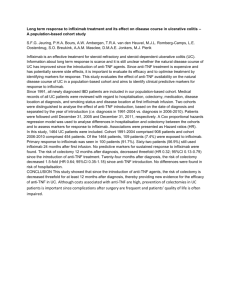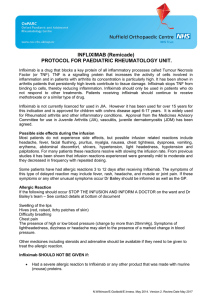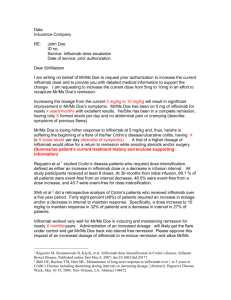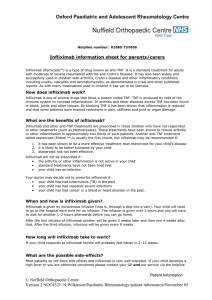Oxford Paediatric and Adolescent Rheumatology Centre (OxPARC)
advertisement
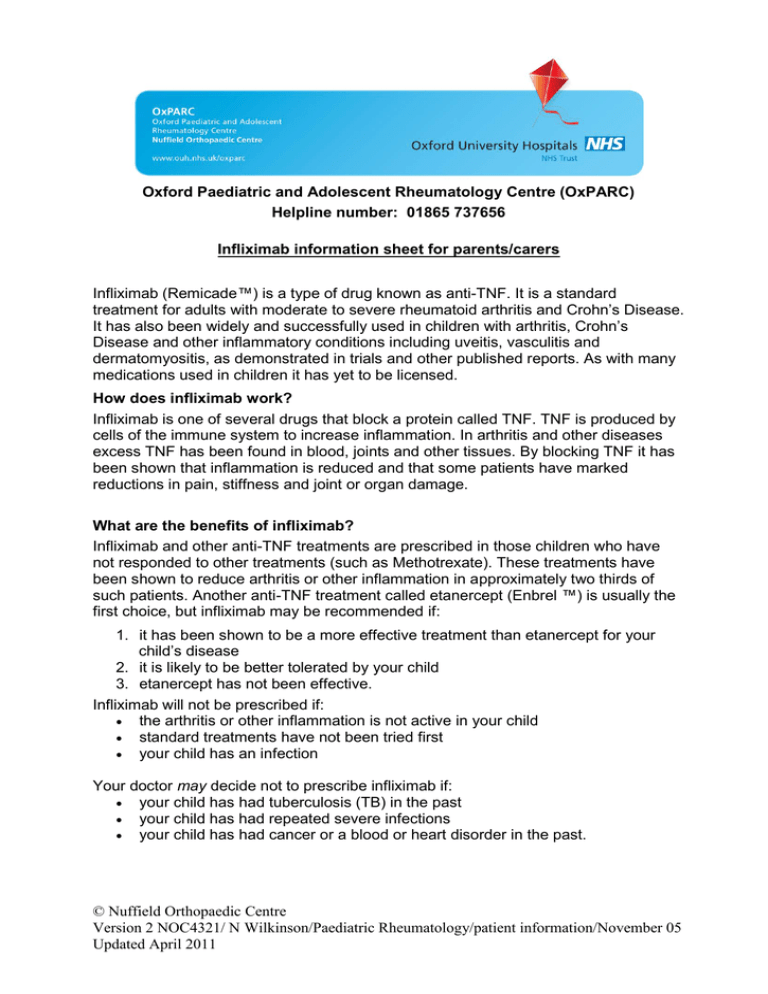
Oxford Paediatric and Adolescent Rheumatology Centre (OxPARC) Helpline number: 01865 737656 Infliximab information sheet for parents/carers Infliximab (Remicade™) is a type of drug known as anti-TNF. It is a standard treatment for adults with moderate to severe rheumatoid arthritis and Crohn’s Disease. It has also been widely and successfully used in children with arthritis, Crohn’s Disease and other inflammatory conditions including uveitis, vasculitis and dermatomyositis, as demonstrated in trials and other published reports. As with many medications used in children it has yet to be licensed. How does infliximab work? Infliximab is one of several drugs that block a protein called TNF. TNF is produced by cells of the immune system to increase inflammation. In arthritis and other diseases excess TNF has been found in blood, joints and other tissues. By blocking TNF it has been shown that inflammation is reduced and that some patients have marked reductions in pain, stiffness and joint or organ damage. What are the benefits of infliximab? Infliximab and other anti-TNF treatments are prescribed in those children who have not responded to other treatments (such as Methotrexate). These treatments have been shown to reduce arthritis or other inflammation in approximately two thirds of such patients. Another anti-TNF treatment called etanercept (Enbrel ™) is usually the first choice, but infliximab may be recommended if: 1. it has been shown to be a more effective treatment than etanercept for your child’s disease 2. it is likely to be better tolerated by your child 3. etanercept has not been effective. Infliximab will not be prescribed if: the arthritis or other inflammation is not active in your child standard treatments have not been tried first your child has an infection Your doctor may decide not to prescribe infliximab if: your child has had tuberculosis (TB) in the past your child has had repeated severe infections your child has had cancer or a blood or heart disorder in the past. © Nuffield Orthopaedic Centre Version 2 NOC4321/ N Wilkinson/Paediatric Rheumatology/patient information/November 05 Updated April 2011 When and how is infliximab given? Infliximab is given by intravenous infusion (that is, through a drip into a vein). Your child will need to go to the hospital each time for an infusion. The infusion is given over 2 hours and you will have to wait for another 1–2 hours afterwards before you can go home. After the first infusion of infliximab another will be given 2 weeks later and then one 4 weeks after that. After the third infusion, infusions will be given every 8 weeks. How long will infliximab take to work? If your child responds to infliximab he/she will probably feel better in 2–12 weeks. What are the possible side-effects? Most patients tolerate Infliximab very well with few side effects. If your child develops a high fever or you are otherwise concerned please contact your GP and our service via the helpline number above. We are always happy to discuss your concerns and if you have left a message will get back to you within 24-48 hours during normal working hours. The more commonly reported side effects of infliximab include a blocked or runny nose, headache, dizziness, flushing, rash, abdominal pain or indigestion. Because TNF is release by cells to fight infections, blocking it may increase the risk of infection in your child. The risk is small, but you will be asked about this. Most infections do not need specific treatment and the body fights them as normal. Severe infections will respond to antibiotics. In some people taking infliximab, the body may fail to produce enough blood cells to fight infections or help stop bleeding. If your child has a prolonged sore throat or other infection, or if he/she develops increased bruising, bleeding gums or looks very pale, call us and your GP immediately. Rarely, children may be allergic to infliximab. This generally becomes apparent during the infusion, but some reports have indicated allergic reactions occur up to 12 days later. Symptoms may include hives (red, raised, itchy skin), difficulty breathing, swallowing, chest pain, headaches or light-headedness. If these occur the treatment is stopped and other medicines may need to be given. Depending on the type of reaction, treatment may or may not be continued. Very rare side effects reported in adult include effects on the nervous system and the development of other inflammatory disorders. Adults taking infliximab have on few occasions developed a condition called 'druginduced lupus', which is usually mild. The symptoms are a rash, fever and increased joint pain. We will check for this with a blood test. Drug-induced lupus is expected to disappear when infliximab is stopped. Reported effects on the nervous system in adults include changes in vision, weakness in arms and/or legs, and numbness or tingling. In a few of cases these symptoms were thought to be due to multiple sclerosis, but whether this is directly caused by infliximab is unclear. As yet, the long-term side-effects of infliximab are not known because it is a new drug. There may be a very small increase risk of lymphoma above the risk in the normal population. © Nuffield Orthopaedic Centre Version 2 NOC4321/ N Wilkinson/Paediatric Rheumatology/patient information/November 05 Updated April 2011 Are any special checks needed while on infliximab? Your child will have a TB test, a chest x-ray and blood tests before starting treatment and then further blood tests while your child remains on infliximab to monitor its effects. Can my child take other medicines along with infliximab? Most children who are on infliximab will also be prescribed methotrexate. Antiinflammatory drugs should only be given as prescribed by your doctor. Specific painkillers (infliximab is not a painkiller) may continue, unless we advise otherwise. Any new medications should be discussed with us or your GP before starting them, and you should always tell any other doctor treating you that you are taking infliximab. 'Over-the-counter' preparations should also be discussed. Can my child receive immunisations while on infliximab? ‘Non-live’ vaccinations are okay but 'live' vaccines such as, measles, mumps, rubella (German measles) and yellow fever should not be given. Yearly flu inactivated vaccines (injection) and pneumovax are safe and recommended. Adolescents may wish to discuss the following Alcohol consumption - You can drink alcohol while on infliximab, but patients are likely to be taking methotrexate as well, so small amounts of alcohol only. Methotrexate and alcohol can interact and damage your liver. Pregnancy - no-one knows the risk of infliximab to an unborn baby. Women should not become pregnant and men not try for a baby with their partner for 6 months after the last dose of infliximab. Further information is available at the commercial web site www.remicade.com Paediatric Rheumatology Consultant: Dr Kathy Bailey: Contactable via secretary 01865 738026 Paediatric Rheumatology Specialist Nurses: Elaine Parsons and Ruth Etherton: 01865 737656 Arthritis Research Campaign: 0870 850 5000 or www.arc.org.uk PLEASE NOTE: every effort has been made to ensure the content of this information sheet is correct, but information about drugs may change. We will assess your child’s medical circumstances and draw your attention to any other relevant information. © Nuffield Orthopaedic Centre Version 2 NOC4321/ N Wilkinson/Paediatric Rheumatology/patient information/November 05 Updated April 2011

